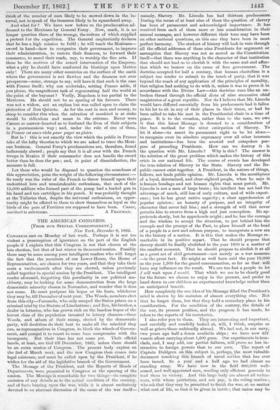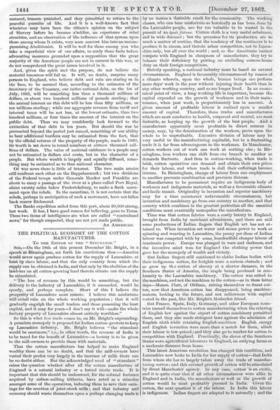THE AMERICAN CONGRESS.
[Fetes OUR SPECIAL CORRESPONDMIT.] New York, Decernber 8, 1862. CONGRESS met on Monday of last week. Perhaps it is not too violent a presumption of ignorance on the part of the English people if I explain that this Congress is not that chosen at the late election, but that of last winter in its second session. Possibly there may be some among your intelligent readers who will forget the fact that the members of our Lower House, the House of Representatives, are chosen for two years, and that they take their seats a twelvemonth after they are elected, unless previously called together in special session by the President. The intelligent reader aforesaid, forgetting this peculiarity in our political ma- chinery, may be looking for some demonstration from the large democratic minority chosen in November, and wonder that it does not come. He must postpone his hopes or his fears, whichever they may be, till December of next year. The Woods, members elect from this city—Fernando, who only escaped the States prison on a criminal trial by the Statute of Limitations ; and Ben, his brother, a denier in lotteries, who has grown rich on the baseless hopes of the lowest class of the population invested in lottery chances—these Woods, and athens of their stamp, elected by the democratic party, will doubtless do their beet to make all the mischief they can, as representatives in Congress, to block the wheels of Govern- ment, and compel it to resort to some base compromise with the insurgents. But their time has not come yet. Their official hands, at least, are tied till December, 1863, unless there should be an extra session of Congress. The present body expires on the 2nd of March next, and the new Congress then comes into legal existence, and must be called upon by the President, if he wishes for the aid of the legislative branch of the Government.
The Message of the President, and the Reports of Heads of Departments, were presented to Congress at the opening of the session. The Menage is remarkable for two things—its complete omission of any details as to the actual condition of the country, and of facts bearing upon the war, while it is almost exclusively devoted to an abstract discussion of the cause of the war itself—
namely, Slavery. Mr. Lincoln luts had thirteen predecessors. During the terms of at least nine of them the question of slavery has been of paramount and acknowledged importance. It has received from each of them more or kw consideration in their
annual meesages, and however different their tone may have been on other national questions, on this one they have been in most harmony. The student of history will look in vain through all the official addresses of these nine Presidents for argument or
assumption that Slavery was not as sacred as the Constitution itself—that there was anything in the character of that institution that should not lead us to cherish it with the same zeal and affec- tion which we bestow on the cause of free government. The
doctrine accepted for half a century, that human chattelism is a subject too tender to submit to the touch of party, that it was
beyond the reach of any application of the principles of morality, that religion had nothing to do with it, unless it was to prove it in accordance with the Divine Law—this doctrine runs like an un-
broken thread through the official dicta of nine successive chief
magistrates of a great republic. Nor do I believe that Mr. Lincoln would have differed essentially from his predecessors had it fallen to his lot to sit in any of their places in their times, or had he been called to take his seat in the Presidential chair in a time of peace. It is to the occasion, rather than to the man, we owe it that this latest Message is devoted to a consideration of
the best method for the utter extirpation of Slavery. To let it alone—to assert its paramount right to be let alone—
to recognize even its absolute supremacy over all other interests
and institutions—has been the avowed and outspoken pur- pose of preceding Presidents. How can we destroy it is
the question with Mr. Lincoln? Why is this? The answer is the solution of the great problem which makes the history of this crisis in our national life. The course of events has developed the true relation of Slavery to the State. Slavery and the Re-
public cannot exist together. A President, in the nature of things, follows, not leads public opinion. Mr. Lincoln is the mouthpiece
of a loyal, determined, and clear-sighted people, when he says it
is human bondage and not human rights that meat perish. Mr. Lincoln is not a man of large brain ; his intellect has not had the
advantage of much, still less of early culture, and of wide experi- ence; but he has great native sagacity ; a clear apprehension of popular opinion ; an honesty of purpose, and an integrity of character that never fail bins ; and a strength of will that never permits him to swerve from a high and just conception. Ile ap- prehends slowly, but he apprehends aright; and helms the courage and the wisdom to accept the situation, to put behind him the example and the precept of the Past, to place himself at the head of a people in a new and solemn purpose, to inaugurate a new era in the history of a nation. It is this that makes the Message re- markable in its positive aspect. That he should propose that slavery should be finally abolished in the year 1900 is a matter of the smallest moment. That he should propose to abolish it at all as a great act of civil government—not merely as a war measure —is the great fact. He might as well have said the year 19,000 as the year 1,900 for the grand consummation, so far as that will
have any influence on the result. We are too fast a people to let I will wait upon! toould. That which we see to be clearly good
for the future we choose to enjoy in the present, and prefer to hand down to our children an experimental knowledge rather than an anticipated benefit.
How completely the one idea of his Message filled the President's mind is shown by his omission of almost everything else. Not that he forgot them, but that they hold a secondary place in his consideration. For the condition of the country, the details of the war, its present position, and the progress it has made, he refers to the reports of his secretaries.
I also refer you to them. They are interesting and important, and carefully and candidly looked at, will, I think, surprise as well as grieve those unfriendly abroad. We had not, in our navy, two years ago half a dozen available ships ; we have now 427 vessels afloat carrying about 1,600 guns. Our experiments in iron- clads, and, I may add, our partial failures, will prove no less in- structive to foreign powers than to our own. The report of Captain Dahlgren on this subject is, perhaps, the most valuable document touching this branch of naval strike that has ever been lamed. So a year and a half ago we had almost no standing army. We have now in the field 800,000 well- armed, and well-appointed men, needing only efficient generals to
lead them to victory. And this large body are almost all vo lun- teers, with whom patriotism, and not pay, is the ruling motive ; who ask that they may be permitted to finish the war, at no matter what cost of life, so that it be given in battle ; that union may be restored, treason punished, and they permitted to return to the peaceful pursuits of life. And it is a well-known fact that whatever may have been the citizen's opinion on the subject of Slavery before he became a'soldier, an experience of rebel atrocities, and an observation of the influence of that system upon those among whom it exists, very soon convert him into an uncom- promising Abolitionist. It will be well for those among you who take a superficial view of our affairs, to study these facts before advocating measures grounded upon a supposition that the great majority of the American people are not in earnest in this war, or do not comprehend the great issues involved in it.
And, given the spirit and the purpose, do not believe the material resources will fail us. It will, no doubt, surprise many persons in England, who believe debt and ruin are staring us in the face, to be assured that, according to the estimates of the Secretary of the Treasury, our entire national debt, on the 1st of July, 1868, will be something less than a thousand millions of dollars, or about two hundred millions of pounds sterling; that the annual interest on this debt will be lees than fifty millions, or ten millions sterling ; while our aggregate revenue from tariff and internal taxes will be not leas, at the lowest estimate, than two hundred millions, or fora times the amount of the interest on the public debt. Thus we may confidently look forward to the extinction of that debt in ten years. But should the war be protracted beyond the period just named, something of our ability to bear additional btuslentt may be estimated from the fact, that by the official teturns of the property of the people, made in 1860, ite worth is set down in round numbers at sixteen thousand mil- lions of dollars. The value of national existence to a people may not be estimated in dollars and cents, but in the character of a people. But where wealth is largely and equally diffused, some- thing may be estimated as to that national character.
Of war news there is little of interest. The two main armies still confront each other on the Rappahlmnock ; but two divisions of the Federal troops under Generals Hooker and Franklin are about to may a passage of the river at a place called Port Royal, about twenty miles below Fredericksburg, to make a flank move- ment upon the rebels. In the meantime, it is not certain that the rebels, perhaps in anticipation of such a movement, have not fallen back nearer Richmond.
The Banks expedition sailed from this port, about 60,000 strong, last week. It has, I have good reason for believing, gone to Texas. These two items of intelligence are what are called "contraband news," for though suspected, they are not yet made public.
Are AMERICAN.































 Previous page
Previous page